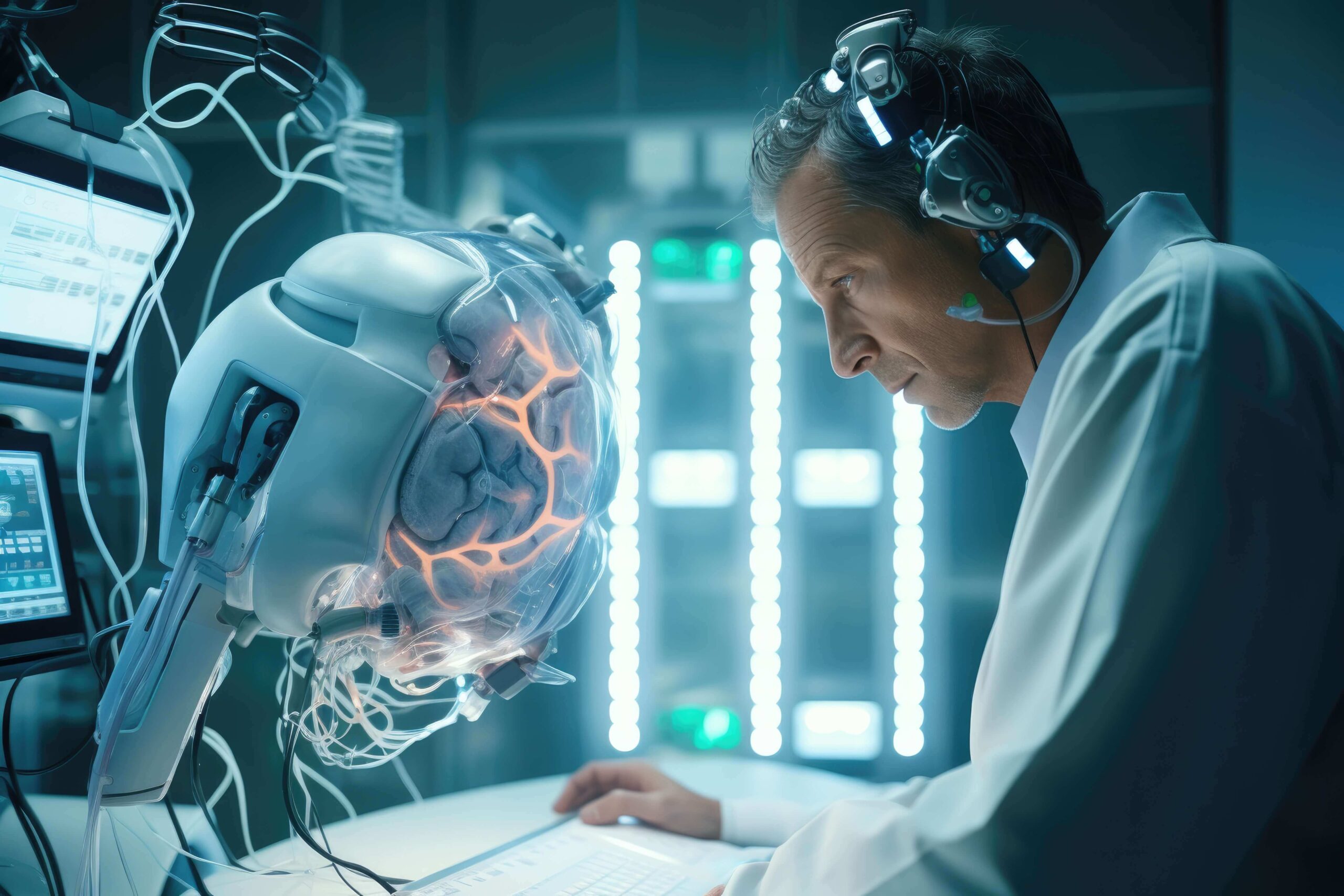Artificial Intelligence (AI) has emerged as one of the most powerful forces driving transformation in the healthcare industry. From diagnosis to treatment, AI is enhancing the way healthcare professionals deliver care, improving patient outcomes, and reducing inefficiencies across the entire healthcare ecosystem. In this article, we explore the various ways AI is revolutionizing healthcare, the innovations it brings, and the lasting impact it is having on the industry.
1. Introduction: The Role of AI in Healthcare
Artificial Intelligence in healthcare is rapidly evolving, transforming various aspects of patient care, hospital management, and medical research. AI-powered systems are helping healthcare providers make more informed decisions, streamline administrative tasks, and deliver personalized care to patients. By analyzing vast amounts of data, AI can identify patterns, predict outcomes, and offer insights that humans alone may miss.
With AI’s increasing ability to learn, adapt, and predict, the healthcare sector is seeing advancements in several areas, including diagnostics, treatment, patient care, and even drug discovery. The ability to harness AI’s potential is unlocking new levels of efficiency and accuracy, paving the way for a future where healthcare is more effective, accessible, and affordable.
2. AI in Diagnostics: Enhancing Accuracy and Speed
One of the most significant ways AI is revolutionizing healthcare is by improving the accuracy and speed of diagnostics. AI algorithms can process medical images, such as X-rays, MRIs, and CT scans, faster and more accurately than human radiologists in some cases. AI tools can detect abnormalities, such as tumors, fractures, and diseases, and provide early alerts for potential issues, allowing doctors to make quicker decisions and intervene at an earlier stage.
For example, AI-powered diagnostic tools like deep learning models have shown promise in detecting conditions like cancer, heart disease, and neurological disorders. By analyzing medical data and recognizing patterns in imaging, AI offers a more precise approach to diagnosis, reducing human error and improving patient outcomes.
3. Personalized Medicine: Tailoring Treatments to Individual Patients
AI is making it possible for healthcare providers to deliver personalized care based on a patient’s unique genetic makeup, medical history, and lifestyle factors. Through AI-powered tools, doctors can analyze genetic data to determine the most effective treatments and medications for individual patients. This personalized approach ensures that patients receive treatments tailored to their specific needs, minimizing the risk of adverse effects and maximizing treatment efficacy.
For example, AI is being used in oncology to recommend the best treatment options for cancer patients based on their genetic profiles and the genetic makeup of their tumors. This personalized approach is enhancing the accuracy of cancer treatments and improving survival rates for patients.
4. Predictive Analytics: Improving Early Detection and Preventative Care
AI’s ability to analyze vast amounts of data allows it to identify patterns and predict health trends, which can lead to earlier detection of diseases and improved preventative care. Predictive analytics tools can use patient data, including medical history, lifestyle factors, and genetic information, to forecast potential health risks and suggest preventative measures.
In chronic disease management, AI is helping doctors anticipate complications and intervene before conditions worsen. For example, AI can analyze data from wearable devices, such as fitness trackers or smartwatches, to monitor heart rate, blood pressure, and activity levels in real-time, providing early warnings for heart conditions or strokes. Predictive analytics allows healthcare professionals to take proactive steps in managing patient health and reducing long-term healthcare costs.
5. AI in Drug Discovery: Accelerating Medical Research
AI is also playing a vital role in accelerating drug discovery, potentially saving years of research and development. Traditional drug discovery is a lengthy and expensive process, with many candidates failing in clinical trials. However, AI algorithms can rapidly analyze vast datasets of molecular information and predict how different compounds will interact with biological targets.
By leveraging machine learning models, researchers can identify promising drug candidates more efficiently and accurately. AI is also being used to predict the outcomes of clinical trials, reducing the risk of failure and speeding up the process of bringing new treatments to market. AI has already shown its potential in discovering treatments for diseases like cancer, Alzheimer’s, and infectious diseases.
6. AI and Virtual Healthcare: Transforming Telemedicine and Remote Care

The COVID-19 pandemic accelerated the adoption of telemedicine, and AI is further enhancing virtual healthcare services. AI-powered chatbots and virtual assistants are increasingly being used in telemedicine to provide instant consultations, answer patient queries, and triage health conditions. These systems can assist healthcare providers by offering preliminary diagnoses, helping patients with routine medical concerns, and guiding them on whether they need to visit a healthcare facility.
AI is also improving remote patient monitoring. Through wearable devices, AI can track vital signs such as heart rate, glucose levels, and oxygen saturation in real-time. These devices can send alerts to both patients and healthcare providers when abnormalities are detected, allowing for timely interventions and reducing hospital readmissions.
7. AI in Healthcare Administration: Reducing Costs and Increasing Efficiency
AI is not only improving patient care but also streamlining administrative tasks, which can significantly reduce healthcare costs and improve efficiency. AI-powered systems can automate administrative processes such as scheduling, billing, and patient intake, freeing up time for healthcare professionals to focus on patient care.
In addition, AI can analyze hospital operations and supply chain data to optimize resource allocation and inventory management. By improving hospital workflows and reducing administrative overhead, AI is contributing to a more cost-effective healthcare system.
8. Challenges and Ethical Considerations of AI in Healthcare
While AI is transforming healthcare, it also presents several challenges and ethical considerations. Ensuring patient privacy and data security is a top concern as AI systems process large amounts of sensitive medical information. Healthcare providers must adhere to strict data protection regulations, such as HIPAA in the U.S. or GDPR in the EU, to safeguard patient data.
Additionally, there are concerns about AI bias. If AI models are trained on biased or incomplete data, they may produce inaccurate results that disproportionately affect certain populations. Ensuring fairness, transparency, and accountability in AI systems is essential to avoid these pitfalls.
9. The Future of AI in Healthcare: What’s Next?
The future of AI in healthcare is incredibly promising, with ongoing research and advancements continuing to push the boundaries of what’s possible. As AI becomes more integrated into healthcare systems, we can expect to see further innovations in personalized medicine, early disease detection, and treatment optimization.
One area with immense potential is AI-driven robotic surgery. AI-powered surgical robots are already being used for minimally invasive procedures, and future developments could lead to even more precise and effective surgeries. Furthermore, as AI systems continue to learn and improve, they may even surpass human expertise in some areas, enhancing the overall quality of care.
Also Read: Ai Ethics: Navigating The Challenges Of Artificial Intelligence In The Modern World
10. Conclusion: Embracing AI for a Healthier Future
AI is undoubtedly revolutionizing healthcare, bringing forth innovations that improve patient care, enhance the accuracy of diagnoses, and streamline administrative processes. As AI technologies continue to evolve, they hold the potential to transform the healthcare landscape in ways we can only begin to imagine. However, it’s crucial for healthcare providers, policymakers, and technology developers to address the ethical, privacy, and regulatory challenges associated with AI to ensure its responsible and equitable implementation.
By embracing AI in healthcare, we are paving the way for a future where medical care is more accessible, efficient, and tailored to individual needs, ultimately leading to better outcomes for patients worldwide.

